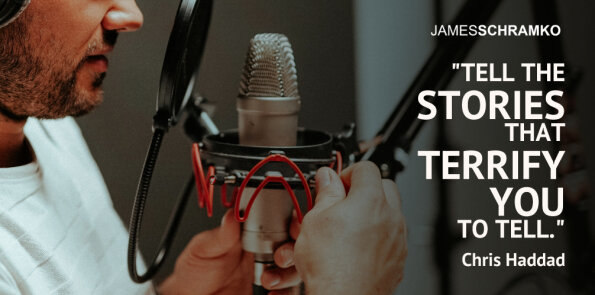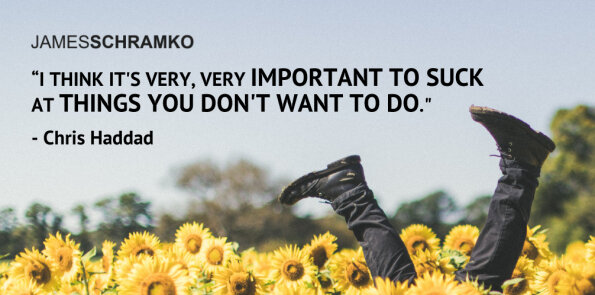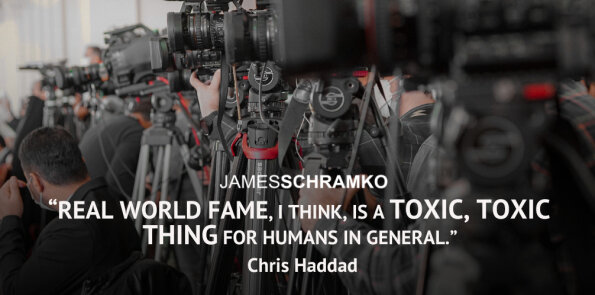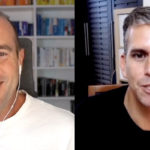Podcast: Download ()
Get Notified Of Future Episodes Apple Podcasts | Spotify | Amazon Music | Android | Blubrry | Gaana | TuneIn | Deezer | Anghami | RSS | More
LANGUAGE WARNING: This episode contains strong words and profanity.
Chris “Mr. Moneyfingers” Haddad is a household name in online marketing. In this guesting, he and James talk podcasting, copywriting, and much more.
You’ll hear how Chris became Mr. Moneyfingers, and why copywriters are so weird.
Chris tells the story of starting his podcast, and why the right name is so important.
And he and James discuss why you don’t need famous guests, and what would-be podcasters can take away from the episode.
Table of contents
1. Why are copywriters so weird?
2. Where the Mr. Moneyfingers comes from
3. What is this P.I.G. method?
4. When you can feel good about what you do
5. Topic, name, or number first?
6. Why you don’t need famous guests
7. Is it about conversions, or leads?
8. The things some people ask guests to do
9. What the right name can do
10. What stories should you tell?
11. How the Chris Haddad podcast came about
12. Podcast benefits and stoicism
13. Getting guests
14. When incompetence is a good thing
15. Where will Chris go with his podcast?
16. If you’re thinking of doing a podcast…
Why are copywriters so weird?
Nine hundred sixty-three episodes. Chris is impressed – his own show is all of six months old.
James’s first podcast episode was with John Carlton, back in 2009. Chris knows John, and like other fellow copywriters he knows, he’s something of a weirdo.
Why are copywriters weird, James wonders?
The job takes a certain level of weirdness to do well, Chris thinks. As a copywriter, you need to see the world a little differently, to try to come up with some angle that’s not been heard before.
Most copywriters are pretty antisocial and introverted, says Chris. He’s grown somewhat out of that.
Where the Mr. Moneyfingers comes from
James wants to hear about the nickname. Mr. Moneyfingers is an unusual moniker.
Does James know Joe Barton, asks Chris? He’s Chris’s favorite conservative religious person.
James does know Joe, a health dude.
Joe was Chris’s very first client – he wrote five or six sales letters for him.
One day Joe called up Chris and greeted him, Mister Moneyfingers! Chris liked the name, and has gone by it since, with Joe’s blessing.
What is this P.I.G. method?
Now James can’t have Chris on the show and not talk about the P.I.G. Method. He saw Chris crowdsource the naming and the production of this great festival of product launch, he says.
It’s a festival of product knowledge, says Chris. He launched it in December of 2021, and P.I.G. stands for Punched in the Gut.
It’s something people have asked Chris to create for years, a resource for doing what Chris does best, emotional copywriting that tells stories and can make sales off pretty much anybody.
The December launch went well – they did $750,000 from a Facebook group with no affiliates, no paid traffic, no nothing, at a $6,000 price point.
Now Chris is enrolling people, doing a rolling kind of high-ticket call funnel and teaching more and more people how to write copy.
When you can feel good about what you do
Chris loves that he can vouch for the quality of his product and not have to hype it. It’s simply, Here’s my stuff; here’s the people that have been through it; here’s the money they’re making; and here’s what they say.
Integrity pays – James has clients in his highest level program who have been with him for 11 years, because he delivers. He has revenue share partners who have been with him now for six years.
When people are with you for that long, you get to know them.
Chris loves his students – he calls them his kids. One of them marveled that Chris actually seemed to care.
I do care, says Chris. He likes getting paid, but he also really cares about the people he teaches and what they’re getting.
Topic, name, or number first?
James noticed Chris started off labeling with episode numbers, then changed it to guests’s names, and now starts with the topic name.
Yeah, they keep swapping it around, says Chris. He really thinks they’ll ultimately go with the guest name and then the title, but it will be interesting to figure out, because he doesn’t want every guest to be a big-deal person.
His goal is to bring on people he finds interesting, who he’ll have an interesting conversation with. If they’re not somebody who’s “famous”, who cares?
James offers his experience – they didn’t number the episodes till five or six hundred eps in, when they also deleted a bunch of subpar episodes.
Why was that, asks Chris?
James’s reason was it was so much easier to reference a number for people to go and find an episode. His team have also done a list-all page on his site, containing every episode in order of publishing.
Chris will make a note of that. It’s one of those things you figure out as you go.
Why you don’t need famous guests
And Chris is right about fame, says James. He himself never decided that he wanted the most famous people on his show.
Sometimes the most famous names make miserable guests. And Chris nailed it out of the gate with his first episode featuring the success of a student of his, Pauline.
That’s the kind of episode that sells whatever you have to offer, says James. Case studies have time and again proven to him that they convince people to buy.
Guests people have never heard of, who have gotten a result, are hugely more relatable than someone famous. And when someone like, say, Pat Flynn comes along, who also vouches for the product, that’s just extra good.
Is it about conversions, or leads?
James has said that podcasting is about conversions as opposed to lead generation, and Chris likes that. He’s had a fair number of people join his Facebook group after hearing about it on the podcast.
And Chris thinks of his podcast as a kind of filter. A percentage of people exposed to his personality and weirdness will decide they like him and want to buy his stuff. Others will decide the opposite.
James himself has never done the podcast for the sake of ads. Chris is not on the show for the purpose of sharing it with his Facebook list; James has asked him on so that listeners can gain insights, especially if they’re thinking of podcasting.
The things some people ask guests to do
Chris has a question. He’s guested on a fair number of shows, and while he enjoys it, sometimes the hosts want him afterwards to promote the show, say, so many times in so many days.
He’s happy to post about a show on Facebook, but he’s not going to send five days of mailings to his list.
Chris tells his own guests he’d love it if they give some promotion love, but if not, it’s perfectly okay. What’s James’s take?
Asking Chris to mail his list is outrageous, says James. He has his own golden rule with emails. Someone has to be better off for opening the email.
That’s a great way of putting it, says Chris.
This episode, says James, his team will publish on a number of podcast platforms – Apple, Spotify, Soundcloud, YouTube and Facebook are just some. They’ll pull snippets that they will post on socials – Instagram, Twitter, and LinkedIn.
They’ll send out an email to James’s list alerting them to the episode. And shortly, Chris should see a jump in visits to thechrishaddadshow.com.
And because Chris is well-known, his name is in the episode title, which will get much more clicks than if it was left out.
What the right name can do
James is sure Chris will get people joining his group, saying, I heard you on Schramko’s podcast.
That’s why James changed his podcast name – everyone kept calling it Schramko’s podcast.
Do they just call it Schramko’s podcast now, asks Chris?
It’s just JamesSchramko.com.
Chris had considered at one point calling his show Balls Deep with Chris Haddad. He thought it would be funny.
James thinks it would have offended and excluded some people who otherwise would have gotten value from it.
Chris’s thought, too. So he drew inspiration from Parrcast’s shows on true crime – the one on serial killers was named Serial Killers; one on cults was named Cults; the one on unsolved murders, Unsolved Murders.
Sometimes you have to call a thing what it is – it makes it easy to find. So Chris called his podcast by his name.
Chris has nailed so many things out of the gate, says James. It’s shocking in a way; he shouldn’t be so good at it.
What stories should you tell?
Now, Chris did a whole episode around divorce with Scott Rewick, James recalls.
Yeah, says Chris, that was a good one.
And he’s talked openly about mental health and other health matters, says James. He imagines it’s a sort of a journal in the way of self-therapy.
Chris teaches a lot about being vulnerable and open and honest in marketing. So when people ask him, what story should you tell in your marketing, he says, tell the stories that terrify you to tell – those will have the most impact.
Those stories will have the most bonding aspect.
And Chris takes it upon himself to practice what he preaches. He’s very open about himself, including about his bipolar disorder, diagnosed six years ago.
How the Chris Haddad podcast came about
When Chris recovered enough from his illness to work, he started on his P.I.G. Method, and wondered what else he could do to make it work.
He had experience with podcasting, had a big personality and enjoyed it. Let’s put it out there, he thought.
Now beyond leads and conversions, another benefit of podcasting that Chris saw was as an amazing networking tool. He has Rory Sutherland guesting, for instance, simply because he invited him at a mutual speaking gig.
And the show gave Chris something to do on a regular basis instead of being stoned and weepy. So the mental health aspects of podcasting are at least as important to him as everything else that comes along with it.
Then, too, it’s a way of sharing with people, not just about business, but about the personal side of things, i.e., divorce and mental illness, that the audience doesn’t otherwise hear about.
Podcast benefits and stoicism
For James, one of the big outcomes of podcasting is an amazing education. He’s had 963 opportunities to learn something, and every time he’s pulled something out of the show, it’s changed his life.
Some of the guests James has had have given one little snippet, or a saying, or a mantra that’s helped him.
Mindset performance coach Nam Baldwin, for instance, left him with the NEAT method for coping with challenges. N – accept it as Normal; E – expect it; A – accept it; T – tidy up and move forward.
Chris approaches life himself with a bit of stoicism. His take is, sh*t happens, sh*t’s going to happen, more sh*t is going to happen. And that’s okay.
He’s been through a car wreck and Lyme disease and being bipolar and his wife getting seriously ill, but he also has a lot of great things in his life. And he thinks it’s important to celebrate the good even when there’s a ton of bad.
Getting guests
James wants to know: has Chris found it very, very easy to recruit guests?
Chris just approaches people he likes and knows, tells them he wants them on his show at one point. It hasn’t been hard yet.
He usually allows three weeks before a recording. And oftentimes, he runs into someone he thinks is interesting, and says, you should come on my show.
He’ll see how things go when he starts inviting people back, which he sees himself doing in the near future. So far, it’s easy, and he feels confident that he can make a good show with almost any guest.
When incompetence is a good thing
Does Chris have someone handling production?
Chris basically records and forwards the Zoom link to his assistant, with whatever they’re calling the episode. Then he does nothing till it comes out, when he reads the broadcast email and posts about the show on Facebook.
A team in England does the actual production and editing, and makes sure everything gets put together and put up on the various places. This is all the stuff Chris is not good at and doesn’t want to do.
Chris has something called the theory of learned incompetence. At a job years ago in LA, he was an executive’s assistant, and also the guy that could fix the photocopier.
At a certain point, he figured out, if you’re the guy who can fix the photocopier, you’re always going to be the one fixing the photocopier. But if you’re the guy who, when you go near the photocopier, it bursts into flames, you’ll get promoted.
James learned the same at the car dealership, where aside from selling they had to cut rubber mats and install the number plates. It’s important not to be good at the small stuff, he says.
Chris thinks it’s very, very important to suck at things you don’t want to do.
Where will Chris go with his podcast?
Where does Chris see his podcast going?
It’s a good question, says Chris. His plan currently is to keep it going every single week for the foreseeable future – that’s a long-term play for him.
It will be around for at least four or five years, he would guess, unless something happens to him. He sees it as a vehicle to just try to get out there more and see what happens.
Chris’s hope is that it will lead to doing more speaking gigs and the like. Other than that – he’s not really a goal-oriented person, he says.
Neither is James. He did want to be a millionaire, but realized, when you tick some boxes, even that moves away.
And James has recognized that a lot of people are doing things for significance.
It’s interesting, says Chris, because at this point in his life, he doesn’t need that. People do treat him sometimes like a famous person, and when he was younger, he wanted that.
Now he doesn’t really care, and it’s good to be at that point in his life. Because real world fame, he thinks, is a toxic, toxic thing for humans in general.
If you’re thinking of doing a podcast…
What advice would Chris have for someone listening to this, thinking that they might start a podcast on Apple?
Chris would say, just do it. And don’t worry about the numbers for the first year, basically, he adds.
He was actually feeling down about his show’s stats. Then he went to TNC in San Diego, where complete strangers told him they loved his show.
The main thing, he thinks, is consistency. If you’re going to release an episode once a week, do it every week. If you’re going to publish twice a week, do it twice a week.
That to Chris is more important than having every episode be amazing. It just needs to be there every single time, and you want it to be really, really good, but it’s more important that it gets done.
And focus also, he says, on the ancillary benefits that your podcast gets you. People Chris doesn’t know have asked him on his show.
He recalls in particular a kid from Israel – poor English, no questions prepared, no one listening to the show. But Chris thought, Yeah, I’ll go on a podcast.
It’s an amazing door-opening thing, he maintains.
So just do it, and commit to yourself that you’re doing it every single week for a year, and Chris thinks you’ll see the real benefits.
Top advice, says James. He appreciates it. And he feels all the more special that Chris came onto his podcast.
Access a wealth of business resources and support inside the James Schramko community
Liked the show? Enjoy all the episodes when you subscribe on iTunes













Leave a Reply